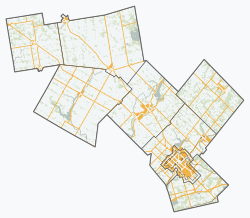Our website is made possible by displaying online advertisements to our visitors.
Please consider supporting us by disabling your ad blocker.
Guelph
Guelph | |
|---|---|
| City of Guelph | |
 Downtown Guelph | |
| Nicknames: | |
| Motto(s): Faith, Fidelity and Progress | |
| Coordinates: 43°32′09″N 80°13′44″W / 43.53583°N 80.22889°W[2] | |
| Country | Canada |
| Province | Ontario |
| Founded | April 23, 1827 |
| Incorporated | April 23, 1879 |
| Government | |
| • Mayor | Cam Guthrie 2014–present |
| • Governing Body | Guelph City Council |
| • MPs | Lloyd Longfield (LPC) 2015–present |
| • MPPs | Mike Schreiner (GPO) 2018–present |
| Area | |
| • Land | 87.22 km2 (33.68 sq mi) |
| • Urban | 87.22 km2 (33.68 sq mi) |
| • Metro | 593.51 km2 (229.16 sq mi) |
| Elevation | 334 m (1,096 ft) |
| Population | |
• City (single-tier) | 143,740 |
| • Density | 1,644.1/km2 (4,258/sq mi) |
| • Urban | 143,740 |
| • Urban density | 1,644.1/km2 (4,258/sq mi) |
| • Metro | 165,588 |
| • Metro density | 278.3/km2 (721/sq mi) |
| Demonym | Guelphite |
| Gross Metropolitan Product | |
| • Guelph CMA | CA$10.6 billion (2020)[5] |
| Time zone | UTC−05:00 (EST) |
| • Summer (DST) | UTC−04:00 (EDT) |
| Forward sortation area | |
| Area code(s) | 519, 226 and 548 |
| Website | guelph |
Guelph (/ˈɡwɛlf/ ⓘ GWELF; 2021 Canadian Census population 143,740)[3] is a city in Southwestern Ontario, Canada. Known as The Royal City, it is roughly 22 km (14 mi) east of Kitchener and 70 km (43 mi) west of Downtown Toronto, at the intersection of Highway 6, Highway 7 and Wellington County Road 124. It is the seat of Wellington County, but is politically independent of it.
Guelph began as a settlement in the 1820s, established by John Galt, who was in Upper Canada as the first superintendent of the Canada Company. He based the headquarters, and his home, in the community. The area—much of which became Wellington County—was part of the Halton Block, a Crown reserve for the Six Nations Iroquois.[6][7] Galt is generally considered Guelph's founder.
For many years, Guelph ranked at or near the bottom of Canada's crime severity list.[8] However, the 2017 index showed a 15% increase from 2016.[9] It had one of the country's lowest unemployment rates throughout the Great Recession.[10] In late 2018, the Guelph Eramosa and Puslinch entity had an unemployment rate of 2.3%, which decreased to 1.9% by January 2019, the lowest of all Canadian cities. (The national rate at the time was 5.8%.[11]) Much of this was attributed to its numerous manufacturing facilities, including Linamar.[12]
- ^ O'Keefe, Dan (January 28, 2010). "Monopolizing Guelph". Archived from the original on January 5, 2015. Retrieved January 4, 2015.
- ^ "Guelph". Geographical Names Data Base. Natural Resources Canada.
- ^ a b c "Census Profile, 2021 Census: Guelph, City". Statistics Canada. February 9, 2022. Retrieved February 9, 2022.
- ^ a b "Census Profile, 2021 Census: Guelph [Census metropolitan area]". Statistics Canada. Retrieved February 9, 2022.
- ^ "Statistics Canada. Table 36-10-0468-01 Gross domestic product (GDP) at basic prices, by census metropolitan area (CMA) (x 1,000,000)". Statistics Canada.
- ^ Pat, Montague (2010). "Historic Wellington County". WampumKeeper.com. Archived from the original on September 22, 2015. Retrieved March 22, 2017.
{{cite web}}: CS1 maint: unfit URL (link) - ^ Lee, Robert C. (2011). The Canada Company and the Huron Tract, 1826-1853. Hamilton, Ontario: Dundurn Books. p. 7. ISBN 978-1-89621-994-3.
- ^ "Crime stats put Guelph ahead in terms of safety". Guelph Mercury. July 24, 2012. Archived from the original on September 24, 2015. Retrieved April 4, 2015.
- ^ "Serious crime in Guelph rose in 2017: StatCan". Global News. July 26, 2018. Archived from the original on August 1, 2018. Retrieved July 31, 2018.
- ^ "Guelph unemployment rate drops even lower". Guelph Mercury. October 17, 2011. Archived from the original on May 14, 2016. Retrieved April 4, 2015.
- ^ "Guelph has lowest jobless rate in Canada". AM1380. February 8, 2019. Archived from the original on February 23, 2019. Retrieved February 22, 2019.
- ^ Young, Leslie (April 8, 2016). "The little city that could: How Guelph got the lowest unemployment rate in Canada". Global News. Global News, Corus Entertainment Inc. Archived from the original on February 2, 2017. Retrieved January 25, 2017.
He pointed to the various manufacturing businesses in the area – Linamar, which primarily makes auto parts, is the city's largest private employer.
Previous Page Next Page






